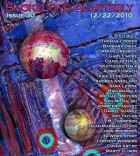I love the way you weave Freddie Mercury into this story of simple hard-working folk with the focus on a young boy and how he “crosses over” the gauzy line between reality and fantasy in “Between Budapest and Dying.” How did this story come to you?
I thought you might ask, and I wondered if I’d really give a shout-out to my good buddy Jonathan Edwards (not the politician, preacher, or folk singer). Looks like I am: One night I was watching the short-lived reboot of American Gladiators and out of nowhere Jonathan said something like: “…that was the year Freddie Mercury helped us fertilize Christmas trees,” which certainly caught my attention. He proceeded to say someone who looked like Mercury helped him and his dad with their Christmas tree farm one year, but Jonathan never caught his name. I had helped Jonathan and his dad fertilize Christmas trees one Easter, years ago, eleventh grade I think, so I had some nice memories to work with in imagining this unlikely possibility.
Music permeates this story from the introduction of Freddie in the first line to the boy’s statement that he and his father have different musical tastes to Freddie’s rhythm in doing the simple job of fertilizing the trees: “…the first beat from the bucket knocking his thigh, the second from his hand diving in the bucket, and the ‘cha’ of tiny grains of fertilizer pattering under the trees.” This motif continues to the very end of the story: “All I know is, when I hear ‘Somebody to Love,’ I smell pine and Fraser Fir.” How do you go about making certain that your stories have this kind of coherence?
This motif was an organic one that didn’t take the conscious effort that some stories require in later revisions. Generally, I try to “call it like I see it” in the early drafts, then see what elements there are to work with in the revision process, but because of the story’s incredible (in the “hard to believe” sense) premise, I let the speaker do the work. The kid has to tell the story in such a way that the listener might believe Mercury could actually have helped with the farm. Naturally he’s going to be looking for as many clues as possible, even if it’s a stretch, to substantiate the narrative, but also there are comments like the one about the father that would be consistent with a kid who loves and has thought extensively about music and rock n’ roll. I enjoy the final bit about “the secret to rock n’ roll.” To me this rings true to the character’s age and sense of wonder and mystery. I remember junior high being a time for ideas like these to flourish in the cafeteria, between classes, and after school.
This story is just under 1000 words–994 to be exact–and I was wondering how word count helps or hinders your writing process and what other short-short fiction do you write, nano, hint, micro?
For me, story dictates word count. I love short-shorts, flash, micro, but usually whatever concept/image/line that has supplied the creative catalyst seems to possess a kind of innate, predestined length for itself. While I write pieces of varying lengths, in general, I think I favor the 900 to 1,300 word range. I tend to experiment and take more chances with shorter pieces, which makes the writing process exciting and presents new challenges with every piece. I hope to one day be proficient in writing stories of all lengths.
I BLED to get this story under a thousand words. Originally the story was around 1,350 words, but I pared it down to fit the word count requirement. Even though I’d revised the piece numerous times and it broke my heart to lose little details, I think having been forced to cut so many words taught me a valuable lesson about refining and distilling the narrative.
I notice from your bio that you teach English at East Carolina University and are the advisory editor for Tar River Poetry. What advice do you give your students who want to improve their writing?
Read what you want to write. God forbid, if you want to add another vampire novel to the vampire novel canon, then read all the vampire novels you can get your hands on. But I teach a lot of freshmen how to write formal academic prose, so we read a lot of academic essays. When we write narratives, we read narratives. But on learning sentence level prose, I try to steer them away from trash and towards solid, reputable published writers. Whatever skill they struggle with, commas for example, I tell them to take note of how published writers use commas in sentences—even if it’s just paying attention to comma usage in their Biology textbook.
What are you working on now?
I’m doing a lot of reading right now. I certainly believe reading is investing in your own writing/work. I’m trying to wrap my head around the idea of writing a novel, but in doing so (and taking my own advice above), I’ve been spending time reading and studying the novel as a form while trying to learn a bit about style as well. I’m going to read a few short fiction collections, then continue studying the novel. The sheer number of words is daunting, but probably there are a lot of freedoms that come with storytelling in the novel that I won’t know until I’ve tried writing one. In the meantime, my man Tommy Wolfe’s words invoked from You Can’t Go Home Again apply: “There’s no danger of your drying up. The only danger is of freezing up. …Make your mistakes, take your chances, look silly, but keep going. Don’t freeze up.”



 The core workshop of SmokeLong Fitness is all in writing, so you can take part from anywhere at anytime. We are excited about creating a supportive, consistent and structured environment for flash writers to work on their craft in a community. We are thrilled and proud to say that our workshop participants have won, placed, or been listed in every major flash competition. Community works.
The core workshop of SmokeLong Fitness is all in writing, so you can take part from anywhere at anytime. We are excited about creating a supportive, consistent and structured environment for flash writers to work on their craft in a community. We are thrilled and proud to say that our workshop participants have won, placed, or been listed in every major flash competition. Community works.